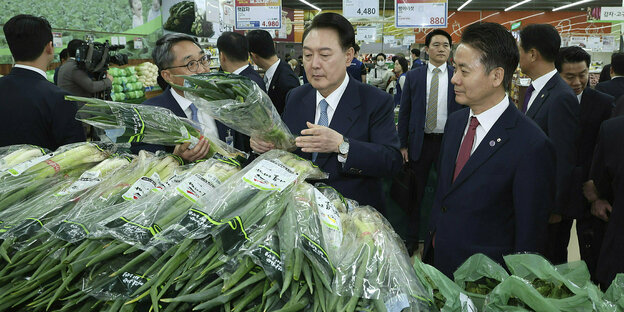Social inequality is growing in South Korea. This could seriously harm conservative President Yoon Suk Yeol in the elections.

President Yoon Suk Yeol checks market prices in Seoul Photo: ap
SEOUL taz | In the city center of Seoul, the rich and the poor are often close together: in the shadow of Seosomun High Street, squeezed between glass office buildings and luxury residential towers, the elderly line up in the morning to pick up his free lunch in front of a social center. – almost unnoticed by the people in suits who rush with them to work with their iced American coffee.
Rising inequality will be an issue when South Korea votes on Wednesday. In parliamentary elections held every four years, 44 million voters elect 300 mandates. It is, above all, a test of mood for conservative President Yoon Suk Yeol, who has been in office for two years. The left-liberal Minjoo party currently has a parliamentary majority. It is difficult to make reliable forecasts because the population is divided into three almost equal camps: the center right, the center left and the undecided voters.
The conservative camp advocates toughness towards North Korea and China, as well as a close bond with the US and a historic reconciliation with Japan, the former colonial power.
The left, on the other hand, denounces the Japanese government for its historical revisionism and is more concerned with maintaining balance between Beijing and Washington. But foreign policy barely influences the elections.
World's lowest birth rate shows discontent
Instead, most South Koreans worry about everyday problems such as rising food prices, high housing costs and long work hours. Social conflicts have contributed to making the demographic crisis even worse.
South Korea's birth rate fell to 0.72 last year, the lowest in the world. The fact that South Korean women increasingly do not want to have children is not only due to a modern and individualistic lifestyle, but also shows widespread discontent.
The negative mood contrasts with South Korea's impressive global soft power: South Korean pop music, TV series, and food culture are hugely popular in virtually every part of the world. In addition, the country on the banks of the Han River is also a leading export nation of semiconductors, automobiles and cosmetics.
South Korea's rise from a desperately poor agricultural state to the world's 13th largest economy is one of the most impressive economic successes in recent decades.
But inside the country, the population is increasingly frustrated with internal politics. President Yoon, in particular, is considered largely unpopular. This also has to do with a possible corruption scandal involving his wife, who was filmed receiving a designer handbag as a gift.
President Yoon Suk Yeol could become an “outgoing duck.”
Critics also accuse Yoon of using authoritarian tendencies to suppress critical reporting and pursue policies in the interests of the upper class. If he is punished in the parliamentary elections, he risks becoming an “outgoing duck” despite another three years in office.
His biggest political opponent, Lee Jae Myung, leads the opposition Minjoo Party. This 60-year-old man comes from a humble background and has worked as a workers' lawyer.
But the hope of the left camp is only seen by moderates as a “lesser evil”: Lee not only stands out for his strong populism, but is also being tried for accusations of corruption.